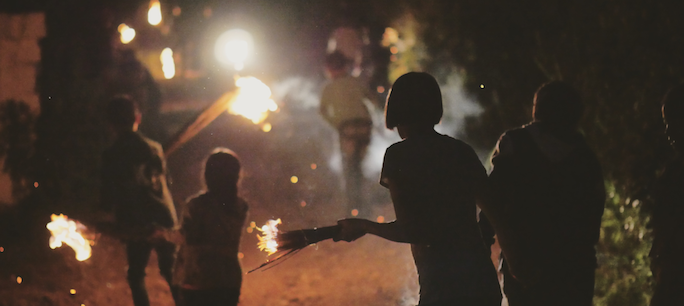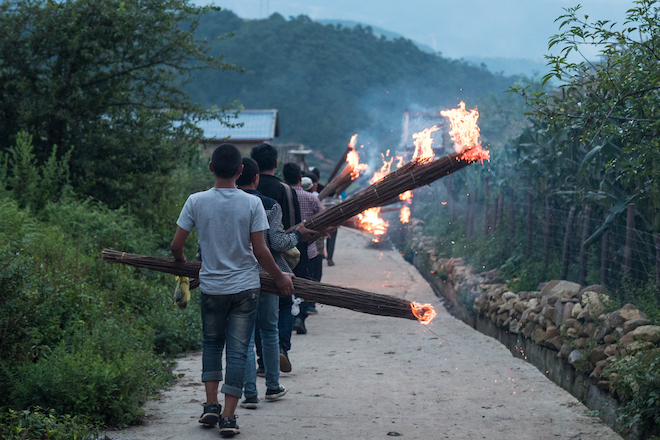Carrying the Torch
Clashing horns at a grasslands festival – by Edward Columbia

I didn't see the bull at first.
We had come four hours on gut-scrambling roads to this grassland site, above a Yi minority village in Sichuan province. Ordinarily, this was a quiet place of rolling meadows, but today was the first day of the annual Yi Torch Festival, and the grasslands had been transformed into a lively fairground for the holiday revelries.
Hundreds of local Yi people, along with the occasional Han photographer from out of town, squatted on the scrub-pocked hillside. The flatland was a smoky campground of parked vehicles, where vendors sold toys out of their trunks and women in colorful headscarves pulled skewers of hotdog meat and sliced potatoes from vats of oil.
The sound of cheering brought me to the edge of a circular field marked with white spray paint between two crowded hills. The circle was empty, but cheering continued from all sides.
The crowd on the hill to my right swelled and broke like a frantic wave. Two small children in sweat-suits rushed past me, laughing. A tall young man in a black jacket adorned with silver balls dashed partway up the hillside. Others followed suit, dashing this way and that. As the crowd parted, I saw that people were dodging the path of a massive brown bull. The animal's nostrils flared and spouted steam into the air as it lumbered.
From a long table perched on one of the hills, unfazed announcers narrated the action below in a rolling chant of Yi language. Soon several young men with wooden crooks wrangled the wayward bull, which had made its way across the circle and into the crowd on the opposite hill. One of the men got hold of the bull's nose ring and led it away.
Festivities resumed without missing a beat. Two groups of handlers led two new bulls into the middle of the circle, and the next bullfight was on. The bulls took heady whiffs of each other. They stepped in close circles, pressed together. Frenzied eyes bulging from their sockets, they nudged their horns into each other's paunch. The announcers continued their unabated stream of narration. The people in the crowd urged on their favored bull. The bulls bloodied and jostled each other until one fled the circle, leaving the victor to stamp the dirt triumphant.
The annual Yi Torch Festival begins on the 24th or 25th day of the sixth lunar month of the Yi calendar (corresponding to late July or early August) and lasts for three days. For China's Yi communities, largely concentrated in the southwestern provinces of Sichuan and Yunnan, the Torch Festival is among the biggest events of the year. I was in the grasslands of Ri Du Di San, just above the Yi village of Gan Tiandi, high in the mountains above Puge county in Liangshan – an automonous prefecture home to over 2.2 million Yi people, which hosts more Torch Festival celebrations than anywhere else.

The legend of the holiday's origins most commonly told in Yi communities in Liangshan involves a momentous wrestling match between two demigods, one on earth and one in heaven. The earthly demigod prevailed, evoking the wrath of a powerful god in heaven, who sent a wave of pestilence to afflict the mortals below. The victorious hero guided the Yi in lighting wicker torches to ward off the pestilence. Yi people I spoke to about the holiday might share this myth, but more often spoke to the practicality in earlier times of using fire to cleanse one's home and fields of insects during the height of the summer rainy season, in order to combat sickness and ensure a good harvest.
Today, the necessity of a torch-lit purge of pestilence may not be what it once was, but the practice continues, to banish evil spirits and usher in good fortune in their stead. The holiday now involves not only torch processions and bonfire building but also bull-fighting, ram-fighting, horse-racing, beauty pageants, dancing, singing, and wrestling matches (between mortals).
After many hotly contested bullfights, with more than one bull finding its way into the crowds of onlookers, the next event was a series of ram versus ram battles. Each pair of rams, encircled by a pulsing crowd, would pace backward away from one another before charging full speed into a head-on collision. They crunched horns again and again, until one of the two ran out of the ring, sending one side of handlers into cries of joy and the other into groans of defeat.
As rams clashed on the grass a hundred meters away, the circle that had been used for bull fighting was converted into a horse track. Young Yi riders raced one another, two at a time, around the pitch at breakneck pace. Some jockeys wore Yi formal clothing, while others opted for rough-riding blue jeans and t-shirts. Friends and family of the riders stood on the inside edge of the track and whipped the horses with long switches as they galloped past.
A young rider in a traditional embroidered jacket ultimately won the competition. No more than fifteen years old, his intensity made up for what he lacked in stature. He bent to his horse's mane as he rode, hissing encouragement into its ear. The green tassel of the horse's bridle whipped the air in front of his face, as he whipped the horse's rump. The young man overtook the older rider in front of him, whose cigarette miraculously stayed tucked behind one ear one lap after the next.
While the horses churned up mud below, music blared from speakers on either side of the announcers' table. An old Yi man sat beside the head commentator and sang into a microphone. The veins in his neck bulged as he swayed back and forth on his stool. Next a group of young girls in embroidered dresses and ornate hats sang mountain songs. Their high-pitched melodies lighted on the meadows and echoed against the hills.

Torch Festival celebrations in urban areas lean toward commercial practices in favor of traditional culture, often imbuing such gatherings with a feeling more of a carnival than of a traditional Yi holiday. Still, these events represent an economic boon for the host towns and draw large numbers of local young people eager for a bit of excitement.
But high up in the mountains, we were a far-cry from the concert pavilions and grandstands of the county town's government-sponsored festivities. What makes the arduous trip to Ri Du Di San worthwhile is that Torch Festival celebrations there are organized and carried out exclusively by Yi communities from the surrounding areas. Ri Du Di San is among the oldest sites of the Torch Festival in the region; local Yi people describe it as a 'place of origin' for the holiday ceremonies.
A soft rain began to fall, and bursts of yellow sprung up through the crowd as Yi women opened their umbrellas. The crowd gravitated toward the beauty pageant. Young Yi women in huge silver-studded hats and long dresses draped in silver jewelry paraded through the audience. They strode in circles around the pageant judge as observers pressed in from all sides for photographs and a closer look at their outfits. The women peered through the silver baubles that dangled from the brims of their heavy head-dresses, holding their smiles beneath the weight.
After the beauty contest ended, people began to leave Ri Du Di San, first at a trickle, then in large numbers. A heavy rain would make the mountain road at best treacherous, at worst impassable. Not wanting to be stranded on the mountain, most decided to pass on the wrestling matches -- the last event of the day -- and walked back to their motorbikes, cars, and trucks. On our way out, we paused to watch one match. Two men with swollen biceps wrapped their arms around each other's waist, holding blue sashes between their hands. Not unlike the pairs of bulls and rams feeling each other out, the men took teetering half-steps, bodies pressed tightly together, before one found an opening to hurl the other to the ground.
Daylight waned, and the clouds darkened. A flurry of car and motorcycle horns sounded from the road, as the crowds departed.
On our drive back down through the mountains toward Puge town, we encountered a car wreck. One of the young women who participated in the beauty pageant and her mother had lost control of their car and skidded into the wall of red earth rising from where the road was hewn. Unharmed but now without a car, they climbed into the back row of seats in our van. We descended, soon surrounded once again by the fields of tobacco and corn that cover the foothills. The young woman held her formal head-dress in her lap. With every bump its silver tinkled – the sound of a rain-stick being slowly upended, again and again.
Night fell as we neared Puge. Coming up on a bridge, we noticed a cluster of flames bobbing along the roadside.
We pulled the van over to the side of the road. Some meters ahead several young children on the roadside played with lit wicker torches. They walked slowly, their grandmother in toe.
"Tonight, families let the little ones light the first few torches as they please and go out and have fun," our Yi friend explained.
We looked past the family and out at the night landscape. The torches of many more children danced on the deep-purple hills.
•
Edward Columbia is a junior at Yale College pursuing a degree in East Asian Studies
Photographs by Kateryna Bugayevska, with permission


















